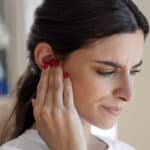Common Questions People Ask About Hearing Aids

If you just got your first hearing test and your specialist recommended treatment for hearing loss, you might have a lot of questions. Let’s look at a few common questions about hearing aids to help clarify the path ahead. 1. Will Hearing Aids Cure Hearing Loss? This is a common question. While hearing aids help…
What To Expect From Hearing Loss Testing and Treatment

Realizing that your hearing isn’t what it used to be can feel overwhelming. Hearing loss is incredibly common, affecting an estimated 13% of people aged 12 and older in the United States, but that doesn’t make the experience any less personal. The good news is that modern hearing loss treatment is a clear, supportive process…
Hearing in Virtual Settings: What To Know

Remote work saw a dramatic increase during and after the pandemic. With so many people still working from home, it’s more crucial than ever to know how to make software like Zoom and Teams work for you. For people with hearing loss, moving to virtual meetings can make conversations clearer and more accessible. Here are…
How to Clean and Maintain Your Hearing Aids

Properly maintaining your hearing aids not only extends their lifespan but also ensures you’ll always enjoy clear, crisp sound. Here’s a simple guide to keeping your devices in top condition, with tips for at-home care and the benefits of professional cleaning. At-Home Cleaning Tips Regular at-home cleaning is essential to keep your hearing aids working…
How Can Hearing Aids Keep You Safe at the Factory or Farm?

Factories and farms are brimming with sounds from the loud motors of heavy machinery to critical safety cues. If you have hearing loss and work in one of these high-risk environments, you may be missing alarms, engine problems, coworker warnings and more. An estimated 18% of all manufacturing workers have hearing difficulty (Centers for Disease…
Hearing Protection on the Job: Best Practices for Manufacturing Workers

An estimated 22 million U.S. workers are exposed to dangerous noise levels each year. When you spend too much time around unsafe noise, the tiny hair cells in your ear responsible for sending sound information to the brain can begin to die. If enough of these hair cells die, permanent hearing loss will arise. If…
How Can Farming Damage Your Hearing?

Driving through Katy farmland gives you a pleasant feeling of peaceful and serene nature. Unfortunately, when you get a little closer, farming can produce more noise than you’d initially expect. The biggest culprit behind this noise is farming equipment. How Loud is Farming Equipment? We measure sound in decibels (dB). Extended or repeated exposure to…
Are Hearing Aids a Good Mother’s Day Gift?

Mother’s Day is on May 11th. With that day fast approaching, you’re probably wondering what to give your mom to say thank you for all she’s done for you. Flowers, jewelry, candles and chocolates are at the top of the list for many people. While these are all great options, one more you may not…
Why Is Spring the Perfect Time to Focus On Your Hearing Health?

Spring is all about fresh starts. You get outside more, make plans with friends, clean your house and start checking things off your to-do lists again. It’s also the perfect time to check in on your health—including your hearing. If you’ve noticed it’s harder to follow conversations or enjoy the little details in your environment,…
The Relationship Between Tinnitus and TMJ

Tinnitus, often described as ringing or buzzing in the ears when no sound is present, is a common condition that can stem from various underlying issues. One less known but significant cause is temporomandibular joint disorder (TMJ), a condition that affects the jaw joint and its surrounding muscles. For those experiencing both TMJ and tinnitus,…